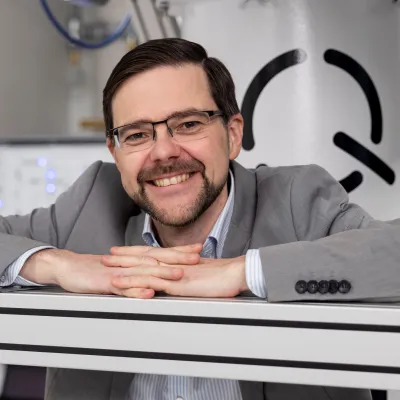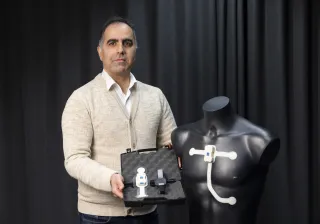Significant progress has been made in the development of quantum computers in Finland, and a global competition about reaching quantum advantage is on-going. Finland has an excellent opportunity to be one of the winners in the development and deployment of next generation quantum technology. In a decisive role are increasingly larger quantum computers.
There is more and more talk about quantum technology and quantum computers, and for good reason. We have learned to control the quantum states of individual particles with precision, which makes it possible to develop new quantum devices such as quantum computers. It has been said that the second quantum revolution is underway. Finland is a forerunner in quantum technology, and long-term cutting-edge research forms the ground for the quantum revolution, where theoretical research delivers commercially used applications for companies.
In the future, powerful quantum computers will be used to develop new materials and medicines more rapidly than before. The combined use of quantum computers and traditional computers is suitable for solving a variety of optimisation problems. The quantum benefits of the future are numerous.
The quantum advantage originally referred to the ability of quantum computers to solve computational problems more rapidly than supercomputers. However, the first real quantum advantage is not necessarily more rapid problem-solving but related to aspects such as saving energy: while a quantum computer solves a problem almost as quickly as a supercomputer, it uses only a fraction of the energy.
Finland is the quantum hub of Europe
Finland has an internationally unique quantum technology ecosystem. Aalto University, the RTOs VTT and CSC and companies are carrying out research, innovating and driving development in the field both together and separately. This fruitful cooperation has created leading international companies such as IQM and Bluefors.
Finland already has a 5-qubit quantum computer. VTT will have a 20-qubit quantum computer up and running later this year and it will be ugraded to a 50-qubit quantum computer in 2024. But this is just the beginning. While a 50-qubit quantum computer will probably be able to demonstrate the quantum advantage in a particular problem, this is not enough. In order to solve industrially relevant computational problems, the computing power must be increased to at least 100–300 qubits.
When the number of qubits increases from 50 to 100, the computing power of a quantum computer does not double – it grows exponentially. This will enable companies to use quantum computing for industrial applications and achieve the quantum advantage.
Building more powerful quantum computers requires solving technological challenges, but these are practical engineering problems rather than basic research. Finland has strong expertise in this field.
A national development project strengthens Finland’s leading position
VTT is involved in European projects such as OpenSuperQ+, which aims to develop a quantum computer with hundreds of qubits within this decade, and Qu-Pilot, in which the manufacturing processes of quantum technology are developed. The Lumi-Q project is developing the joint use of supercomputers and quantum computers – CSC’s Lumi and VTT’s Helmi in Finland.
The national quantum computing development project is important in terms of raising Finland’s profile and the growth of the domestic ecosystem. It promotes the creation of new businesses, in addition to attracting foreign investment and top talent to Finland. While Finland’s ecosystem is already one of the most attractive in Europe for new quantum technology companies, more effort is needed: the decisions made today will determine where the future suppliers of quantum computers – the new intels and IBMs – will emerge.
By creating favourable conditions for companies, Finland can become a global leader in creating a new industry. To benefit from the quantum advantage, Finland needs to develop larger quantum computers. This is essential if Finnish companies are to be competitive in the future.
Pilot environments are also needed where new quantum technology components can be developed on an industrial scale. One such environment is the Kvanttinova pilot manufacturing line for microelectronics and quantum technology proposed by VTT.
Finally, a word of warning. The quantum computer will not replace the traditional computer, as it is only suitable for solving certain problems. Now is the time for companies to explore how and where quantum computing could be useful in their business operations.
The power of quantum computing is currently evolving more rapidly than the power of classical computing under Moore’s law. As this trend continues, it is clear that quantum computing will overtake supercomputers in power – but it remains to be seen when and in which applications. It is therefore important that end users and IT companies start early to explore, develop and exploit quantum computing and prepare for the quantum era.





